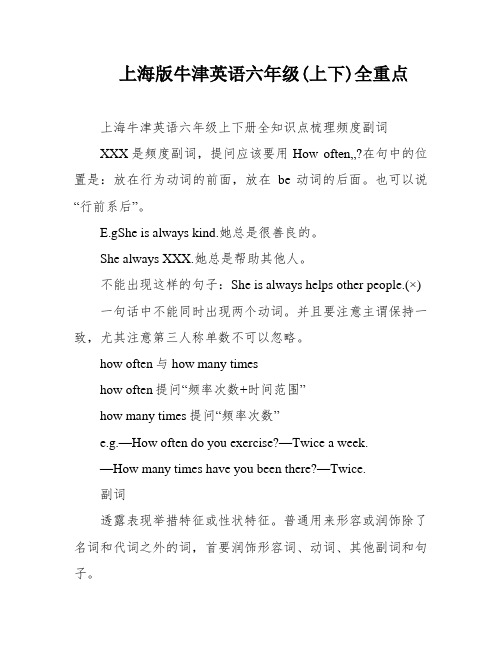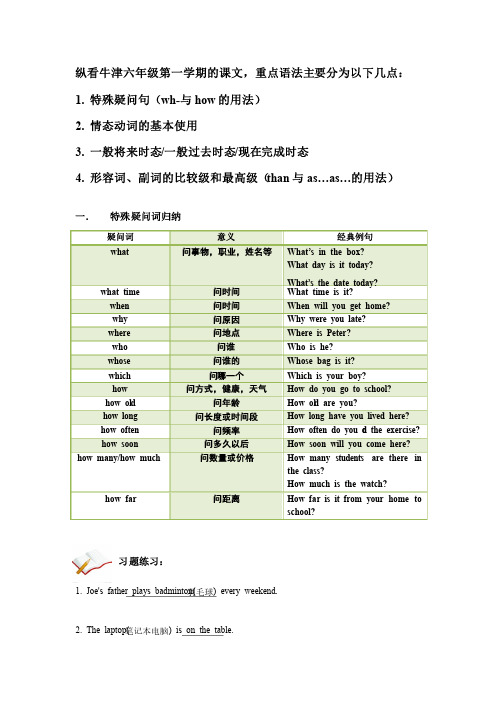上海牛津英语六年级英语知识点整理
上海版牛津英语六年级(上下)全重点

上海版牛津英语六年级(上下)全重点上海牛津英语六年级上下册全知识点梳理频度副词XXX是频度副词,提问应该要用How often…?在句中的位置是:放在行为动词的前面,放在be动词的后面。
也可以说“行前系后”。
E.gShe is always kind.她总是很善良的。
She always XXX.她总是帮助其他人。
不能出现这样的句子:She is always helps other people.(×) 一句话中不能同时出现两个动词。
并且要注意主谓保持一致,尤其注意第三人称单数不可以忽略。
how often与how many timeshow often提问“频率次数+时间范围”how many times提问“频率次数”e.g.—How often do you exercise?—Twice a week.—How many times have you been there?—Twice.副词透露表现举措特征或性状特征。
普通用来形容或润饰除了名词和代词之外的词,首要润饰形容词、动词、其他副词和句子。
XXX happy.(修饰形容词)The old lady is XXX.(修饰动词)Luckily, he got the first prize.(润饰句子)形容词后面+ly组成副词:slow—slowlyslight—XXX—luckilyhappy—happily介词What else do you do with your…?你和你的…还干什么?With是个介词,后面接人称代词时,要用宾格的形式。
With me/him/her/it/us /them在详细的某一楼层只能用介词on,而且第几层还要用序数词On the ground floor, on the first floor, on the XXX详细的某一天介词只能用onOn Sunday, On Sunday morning,On the Open Dayhe one on the left/right左边/右边的这个the one in the middle中间的这个如果是介词短语修饰the one,应该要放在the one后面,如果是形容词应放the one的中间the left/right onethe middle oneXXX XXX在周末目前完成时现在完成时的构成是:have/has +动词的过去分词。
六年级英语下册 重点知识梳理 沪教 牛津版三起

unit 1 重点知识梳理词汇1.weigh(有……重;重)2.kilogram[千克;公斤(缩略形式kg)]3.centimetre[厘米(缩略形式cm)]4.fan[(足球、电影等)迷;爱好者]5.theatre(剧院)6.taller(更高的)7.fantastic(极好的)8.themselves(他们自己;她们自己;它们自己)9.go fishing(去钓鱼)10.enjoy oneself(玩得愉快;得到乐趣)11.get…in(收割)知识点1.询问某人的体重的句型及答语—How much do you weigh, George?乔治,你有多重?—I weigh 40 kilograms.我40千克重。
2.询问某人的身高的句型及答语—How tall are you?你有多高?—I'm 152 centimetres tall.我152厘米高。
3.形容词的比较级4.含频度副词的一般现在时的陈述句play的用法5.how 引导的感叹句6.there be句型7.by+交通工具8.enjoy+反身代词9.There be+not句型Unit 2 Changes in our lives词汇1.life(生活)2.writer(作家)3.street cleaner(环卫工人)4.drive(驾驶)5.poor(贫穷的;差的;次的)6.wish(愿望;祝愿)7.photographer(摄影师)8.film(胶卷)9.digital(数码的)10.sweep(扫地)11.broom(扫帚)12.street sweeper(扫地车)13.wife(妻子)14.fairy(仙子;小精灵)15.by hand(用手)16.right away(立即;马上)17.in a short time(很快)知识点in the past…now…Unit 3 Our school in the future词汇1.carry(背;提;拿)2.mountain(山;山脉)3.even(甚至)4.space(太空)5.online(在线地;在线的)6.head teacher(校长)7.PS[附言(用于信末)]8.dinosaur(恐龙)9.a piece of(一张;一片)10.have a picnic(去野餐)11.better and better(越来越好)知识点1.询问对方想要看到什么变化的句型Change的用法 would like的用法2.祈使句的用法write down的用法3.一般将来时的句型4.“比较级+and+比较级”结构5.help的用法Unit 4 Art词汇1.oil(油)2.brush (画笔;刷子;刷)3.paints(绘画颜料)4.artist[艺术家;(尤指)画家]5.unhappy(不高兴的)6.carefully(仔细地)7.oil painting(油画)8.powerful(强有力的;力量大的)9.ink(墨水;墨汁)10.Chinese ink painting(中国水墨画)11.on the left(在左边)12.on the right(在右边)13.all the time(一直;始终)知识点1.一般将来时的用法The students are going to an art museum tomorrow.学生们明天打算去艺术博物馆。
沪教版牛津英语六(上)语法点

纵看牛津六年级第一学期的课文,重点语法主要分为以下几点: 1. 特殊疑问句(wh-与how 的用法) 2. 情态动词的基本使用3. 一般将来时态/一般过去时态/现在完成时态4. 形容词、副词的比较级和最高级(than 与as as……as as……的用法)一. 特殊疑问词归纳疑问词 意义经典例句what 问事物,职业,姓名等What’s in the box?What day is it today? What’s the date today? what time 问时间 What time is it? when 问时间 When will you get home? why 问原因 Why were you late? where 问地点 Where is Peter? who 问谁 Who is he? whose 问谁的Whose bag is it? which 问哪一个Which is your boy? how 问方式,健康,天气How do you go to school? how ol how old d 问年龄 How ol d are you? d are you? how long 问长度或时间段How long have you lived here? how often 问频率 How often do you d o the exercise? o the exercise? how soon 问多久以后 How soon will you come here? how many/how much 问数量或价格How How many many students are are there there in the class? How much is the watch? how far 问距离How How far far far is is is it it it from from from your your your home home to school? 习题练习:1. Joe's father plays badminton(羽毛球) every weekend.2. The laptop(笔记本电脑) is on the table. 3. My mother is a nurse in the hospital. 4. He gets up at 6:30 in the morning. 5. Li Lei goes to work on foot. 6. It is about 20 kilometers from my home to the town. 7. I have lived in Hang Zhou for 20 years. 8. I’m looking for my watch. 9. The train will start in three minutes. 10. Alice has the violin lesson twice a week. 11. The building with green wall is the post office. 12. He didn’t come because he was ill. 注意事项:由于特殊疑问词孩子们从小学就已经开始接触,对于最基本的what/how/where 等并不感到陌生,出题的难度一般也不会很大。
牛津上海版(深圳)英语六年级总复习知识点总结

总复习要点1一.句子汇总1. 否定句标志:not, no, n’t,“不”。
肯定句例句否定句例句一些some I have some books.我有一any I don ’thave any books.些书。
我没有一些书。
也too I like orange, too.either I don ’tlike orange, either.我也喜欢橘子我不喜欢橘子。
和and You should shake hands or You shouldn’tpush or run.你不应and say“ Hello ”.你应该握手和该推挤和跑。
打招呼。
2.特殊疑问句必用疑问词。
疑问词:what什么, who谁, whose谁的, which where 哪里 , how怎样, how often多常, how long 多少岁, how many多少,how much多少钱。
哪个 , when什么时候, why多长 , how far多远,为什么how old,3.一般疑问句①Be⋯ (Am/ Is/Are/Was/Were ⋯ ? )肯定回答: Yes,⋯is/are/was/were.否定回答:No,⋯isn’t/aren’t/wasn’t/weren’t.如: 1. --Was there a subway 50 years ago?50年前有地铁吗?--Yes, there was.是的,有。
--No, there wasn’t. 不,没有。
2. -- Am I wrong?我错了吗?肯定回答:-Yes, you are.否定回答:-No, you aren’t.②--Do/Does/Did ⋯ ?肯定回答: Yes,⋯do/does/did.否定回答:No,⋯don’t/doesn’t/didn’t.如: Did you find something?你找到什么东西了吗?--Yes, I did.是的,我找到了。
沪版牛津英语六年级上知识点整理

Module 1 Family and friendsUnit 1 Family and relatives1.family and relatives 家庭和亲戚2. a family tree 一个家谱3.grandsons and granddaughters 孙子和孙女们/外孙和外孙女们4.get a lot of presents 得到许多礼物5.Happy Birthday (to sb.) ! 生日快乐!6.get a birthday card from sb. 从某人那儿得到一张生日卡7.one of my family members 我的家庭成员之一8.only have one aunt 仅仅有一个阿姨9.my classmates 我的同班同学10.go shopping 去购物11.what else 其他什么12.play badminton 打羽毛球13.go cycling 去骑自行车14.go swimming 去游泳15.two cousins 两个堂/表兄弟/妹16.how many + 名词复数多少……语言点1. This is my grandfather.这是我的(外)祖父。
These are my family and relatives.这些是我的家人和亲戚。
注意句中各成分保持单复数同形。
2. I‟m their son.. 我是他们的儿子。
We‟re their sons.我们是他们的儿子。
3. How many uncles do you have?你有多少个叔叔?How many后面接可数名词的复数形式。
4. What do you do with your…?你和你的…干什么?5. What else do you do with your…?你和你的…还干什么?6. What else do you do with your…?你和你的…还干什么?With是个介词,后面接人称代词时,要用宾格的形式。
牛津上海版深圳英语六年级总总结复习知识点总结计划

总复习要点 1一.句子汇总1.否认句志: not, no, n ,’t“不〞。
肯定句例句否认句例句一些some I have some books. 我有一些书。
any I don ’thave any books.我没有一些书。
也too I like orange, too. either I don ’tlike orange, either.我也喜欢橘子我不喜欢橘子。
和and You should shake hands and say or You shouldn ’t push or run. 你不应该推挤“ Hello.你〞应该握手和打招呼。
和跑。
2.特殊疑问句必用疑问词。
疑问词: what 什么 , who 谁 , whose 谁的 , which 哪个 , when 什么时候 , why 为什么 , where 哪里, how 怎样, how often 多常 , how long 多长 , how far 多远,how old 多少岁, how many多少,how much 多少钱。
3.一般疑问句① Be⋯(Am/ Is/Are/Was/Were⋯)肯定答复: Yes,⋯is/are/was/were.否认答复: No, ⋯ isn’t/aren ’t/wasn ’t/weren ’t.如: 1. --Was there a subway 50 years ago50年前有地--Yes, there was是.的,有。
--No, there wasn’t.不,没有。
2. -- Am I wrong 我了肯定答复: -Yes, you are. 否认答复: -No, you aren’t.②--Do/Does/Did ⋯肯定答复: Yes,⋯do/does/did.否认答复: No, ⋯ don’t/doesn ’t/didn ’t.如: Did you find something 你找到什么西了 --Yes, I did是.的,我找到了。
上海牛津英语六年级上册模1重点总结(完整资料).doc

【最新整理,下载后即可编辑】上海牛津英语6A重点总结Module 1 Family and relatives家人和亲戚Unit 1 My family tree我的家谱Ask and answer问一问,答一答S1:This is my brother(s). 这是我的兄弟(们)。
These are sister(s). 这些是我的姐妹(们)。
cousin(s). 表弟妹(们)。
uncle(s). 叔叔(们)aunt(s) 姑姑(们)。
S2: How many brothers do you have? 你有几个兄弟?Sisters 姐妹cousins 表弟妹uncles 叔叔aunts 姑姑S1:I only have one …/I have (number)…我只有一个……/我有(成员)……Ask and answer问一问,答一答S1:What do you do with your…? 你和你的…干什么?S2: I always play games/football with my father.总是做游戏/踢足球我的爸爸usually go shopping/swimming/cycling mother.通常去购物/游泳/骑自行车妈妈sometimes go to the park/the zoo. brother(s).有时去公园/动物园兄弟(们)watch TV/see a film sister(s). 姐妹(们)看电视/看电影节uncle(s).叔叔(们)Play badminton/go cycling aunt(s). 姑姑(们)打羽毛球/去骑自行cousin(s).表弟妹(们)grandfather(s).爷爷(们)grandmother(s). 奶奶(们)S1:What else do you do with him/ her/ them?你和他(她、他们)还干别的什么?S2: I always …with him. 我总是和他……usually her. 常常和她……sometimes them. 有时和他们……Language语言◆relatives ◆familymembersgrandfather/grandmother father/mothergrandson/granddaughter孙子;外孙/孙女;外孙女son/daughter uncle/aunt brother/sister cousin◆How many uncles do you have?◆What do you do with your aunt?I always play games with my aunt.usuallysometimesUnit 2 I have a good friend我有一个好朋友Ask and answer问一问,答一答S1:Have you been to …(place) yet? 你去过……(地方)吗?S2: Yes,I have already been to …(place) 是的,我已经去过……(地方)。
牛津英语上海版六年级下册知识点整理

牛津英语上海版六年级下册知识点整理Module1 City lifeUnit1 Great cities in Asian词组:the capital of... ...的首都 north-east东北 from...to...从...到...in the past在过去 the Great Wall长城 more than=over超过eat dumpling吃饺子 tall buildings高楼大厦huge department stores大型的百货商店 a lot of许多语法点:1.Beijing is north of Shanghai.北京在上海的北部。
(1)两地不相邻:A is north of B.(2)所属关系:A is in the north of B.(3)两地接壤:A is on the north of B.2.How far is it from Shanghai to Beijing?从北京到上海有多远?How far... 多远。
询问距离的远近,路程的长远。
3.How long does it take to travel from Shanghai to Beijing by train?坐火车从上海到北京要多久?(1)How long...多久。
询问时间长短。
How long…多长。
用于询物的问长度。
(2)by+交通工具,表示“乘...交通工具”,用How提问。
4.It takes about ten hours.大约需要十小时It takes (sb.) st. to do sth. 做某事需要花费多长时间。
5.They enjoy eating dumplings.他们喜欢吃饺子enjoy/like/love doing sth. 喜欢做某事6.Two and a half days=Two days and a half两天半Half an hour=one and a half hours=one/an hour and a half一个半小时Unit2 At the airport词组:plane ticket机票 silk scarf丝巾 a lot of/plenty of大量的,许多departure time出发时间 leave for出发去某地 have to不得不be going to将要 arrive at到达boarding card登机牌 name tap姓名语法点:1.Aunt Judy and Uncle Mike have lived in Los Angeles for six years.朱迪婶婶和迈克叔叔在洛杉矶已住了六年。
- 1、下载文档前请自行甄别文档内容的完整性,平台不提供额外的编辑、内容补充、找答案等附加服务。
- 2、"仅部分预览"的文档,不可在线预览部分如存在完整性等问题,可反馈申请退款(可完整预览的文档不适用该条件!)。
- 3、如文档侵犯您的权益,请联系客服反馈,我们会尽快为您处理(人工客服工作时间:9:00-18:30)。
一、基础语法知识点:
1.句子的构成:主语+谓语+宾语;
2.时态的正确使用:一般现在时、一般过去时、一般将来时等;
3.动词的正确形式及用法:及物动词、不及物动词、系动词等;
4.祈使句的用法:表示请求、命令、建议等;
5.被动语态的用法:一般现在时、一般过去时、一般将来时等;
6. 句子的否定形式:用not把动词或动词短语置于句子前;
7. 祈使句的否定形式:用don’t/doesn’t let +主语+动词原形;
8. 情态动词should、would的用法:表示建议、意愿等;
9.特殊疑问句的构成:疑问词+一般疑问句的构成;
10.形容词、副词的比较级和最高级形式:用于表示物体之间的比较;
11. 名词性从句的引导词:what、who、which等;
12.过去进行时的用法;
二、词汇知识点:
1.常用名词、动词、形容词、副词的基本词义和用法;
2.常见的固定搭配、短语和习惯用法;
3.数词、时间词、量词的用法;
4.常用介词和介词短语的用法;
5.记录、理解并使用常用的固定句型和表达方式;
三、阅读技巧:
1.能够理解并提取文本中的关键信息;
2.能够根据文本内容进行推测和判断;
3.能够根据问题选择正确的答案;
4.能够理解并使用上下文线索;
5.能够根据语境理解单词和短语的意思;
四、写作技巧:
1.能够用正确的语法和用词写出简单连贯的句子;
2.能够运用所学的句型和句式进行书面表达;
3.能够用英语写简单的对话、日记、邮件等;
4.能够根据要求写出简单的说明文、记叙文等;。
